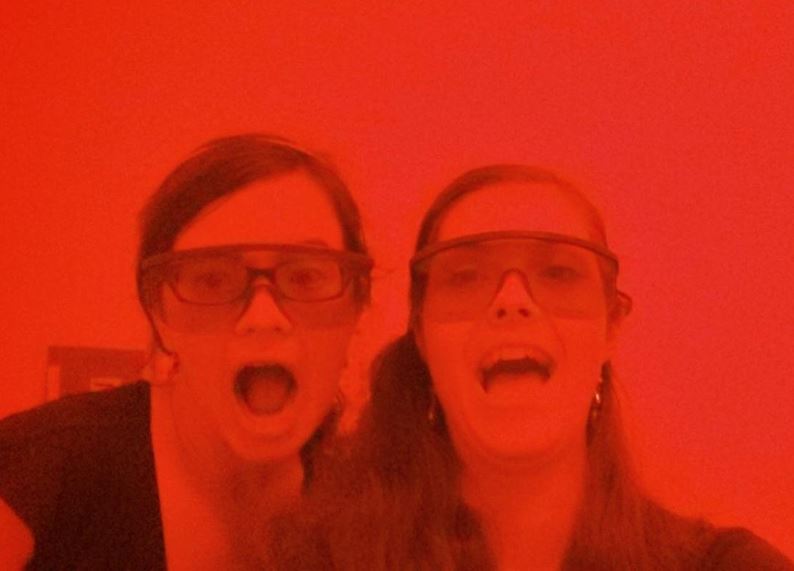Not Just Mad Scientists: A Look at GCC’s Chemistry Department

Lauren Hake – Senior Chemistry Major
For many high school students interested in majoring in chemistry, they enjoy doing experiments and have probably successfully blown something up in their chemistry lab. However, they often have no idea what being a chemistry major really entails. Below is an interview with Lauren Hake, a senior chemistry major with an emphasis in biochemistry at Grove City College. She discusses Grove City College’s Chemistry Department and some of the unique opportunities she has been given during her time here. In the interview, Hake also provides an inside look at the life of a chemistry major to help students who are considering majoring in chemistry.
Why did you decide to major in chemistry?
I decided to major in chemistry because I was good at it in high school and really enjoy hands-on learning – something that chemistry labs require.
You have an emphasis in biochemistry. How did you pick that emphasis and what does it entail?
During my junior year, I chose to take a biochemistry class as one of my electives. I really enjoyed it and kept taking more of the biochemistry courses that were required to get a concentration. It required two biochemistry courses, plus some additional chemistry electives. You can pick from three different concentrations – biochemistry, physical and synthetic.
What do you want to do with your chemistry degree?
I would like to go into quality control for a pharmaceutical company, ideally. I really enjoy working with instrumentation and running the tests required in quality control. I also like the fine detail that goes into different testing methods and that is required for quality control work. Most of the work I’ve done at Grove City has been with instrumentation and that’s really been my focus here.
Have you had any chemistry-related internships? How did you get it?
Yes, I was a Chemical Processing Engineer for Armstrong World Industries in Lancaster, PA. I worked there previously as a product line worker. They needed a chemical engineering intern, so they asked me if I would like to work for them because of my degree in chemistry. I worked to test and maintain their water testing facility, trained operators and wrote a manual for their gas chromatography machine (GC). I also created a trouble shooting guide and designed and ran quality tests to make sure the ceiling board tiles, Armstrong’s product, were in spec.
How many hours a week do you spend in lab?
It varies by year. By your junior year, you’re probably in lab about 20 hours a week. It varies on how many electives you take, and if you chose to be a teaching assistant. Most of those hours are outside your designated lab time, so there is flexibility on how much time you’re in the lab. If you get all your lab stuff done in lab, good for you! But normally you have to come into the lab at extra times to finish labs or for other things you’re doing.
What does a typical lab look like for you?
It depends on the class you’re taking. Freshmen labs teach you how to run instruments and how to do things in lab, like how to properly titrate using a burette. So then, you are prepared for your upper level labs where you are doing a lot of the work on your own and designing portions of the lab yourself. You have enough experience then to confidently work in the lab on your own.
In my personal opinion, the hardest lab you have to do at Grove City is your organic major lab. For a normal week for that lab, you would come in on Tuesday afternoon and you get a vial with only a number on it. You have to first determine the type of compound, and then create a derivative and run an IR (Infrared spectroscopy). This normally takes at least eight hours and often requires that you come in at other times. But it’s a great real-world experience because planning the tests and making the derivative is all up to you. Plus, there is a high probability you will have to identify an unknown at some point in your professional career.

Taking a selfie in the Laser Lab
How long did it take for you to feel comfortable in lab?
I’ve always liked lab, so I’ve always been comfortable in lab. However, I finally felt like I could come into a lab and do it all myself with confidence by the start of my junior lab. Freshman and sophomore year is when I learned all of the necessary lab techniques and how to use all of the equipment. But, junior year is when you start doing it without a lot of aid or supervision. The professors are there if you need them, but you’re able to do it on your own.
Are you involved in any research?
I just completed a three semester research project. Basically, without getting into too many technical details, the Instrumental Analysis class was trying to create polymethylmethacrylate, a type of polymer, using a raft agent. Unfortunately, they couldn’t get a steady molecular weight and steady chain length, so it was my job to use the Differential Scanning Calorimetry Instrument to figure out whether we could get a steady glass transition state, and if not, to figure out what methods were needed to fix that issue. In terms of research, the instrument that I was using was relatively new and no one had really used it yet, so I spent a lot of time working on the instrument to see how it worked and running tests to get consistent responses from the samples.
I got involved in this research by working as a teaching assistant (TA) for the professor, Dr. Falcetta, involved in the research. He liked my work as a TA, so he asked if I would be interested in doing some research for him. It was only supposed to be a short period, but ended up being three semesters worth of work. I got three credits for my research with him. There are a lot of different research opportunities like this for Grove City students and I highly recommend starting research as early as freshman year.
What do you think makes Grove City’s Chemistry Department unique?
Grove City’s department is unique because they allow freshmen students to get hands-on experience with the instruments in the instrument lab. This is very different from other schools, because there, a lab tech would run all of the experiments. Those students don’t get any experience using the instruments. I believe that I am more hirable because I know how to use and operate these instruments. I have found that lots of companies are looking for people who know how to run these instruments well. In fact, that’s one of the reasons I was hired as an intern for Armstrong. They got really excited when they found out I knew how to use a GC.
What’s your favorite experiment/lab that you’ve ever done?
That’s a tough question. I’ve done a lot of great labs here. I’ve extracted DNA from a strawberry using a blender, alcohol and detergent. Another cool lab I’ve done was testing the amount of iron in calf serum, a derivative of blood, using the atomic absorption spectrometer. I liked the DNA lab because it was really cool to physically see the DNA and the sequence coming out. You could see it – it was like clear jelly that floated to the top of the vial. It was really cool to think we extracted it from something as simple as a strawberry. I also just really liked doing the calf serum – it involved fire and who doesn’t like fire! Both of these experiments were very applicable, real-world experiences. I liked how they were done using common items.
Do you have any advice for students interested in majoring in chemistry?
I think the biggest complaint I hear from students who come into the major is that they expect it to be like Breaking Bad, when really it is a lot of theory and mathematics. It’s important that coming into the major, you realize it’s going to be really difficult because you’re learning a lot of information in a short period of time. However, if you talk to upperclassmen, they have valuable advice to give and can help you with some of your classes. It’s also important to know that chemistry isn’t all just playing with fire or extracting DNA from things. There’s a lot of paperwork and boring labs, but it’s all worth it when you get to create new chemicals and make new discoveries.